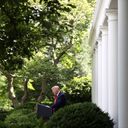Trump to end Hong Kong’s special trade status

Published Date: 5/29/2020
Source: axios.com
President Trump announced on Friday that the U.S. would be fundamentally changing longstanding policies toward Hong Kong as a result of Chinese encroachment on the city's autonomy.Why it matters: Trump said he would be effectively ending the special trade status that has allowed Hong Kong to flourish as a gateway to the Chinese market. That leaves an uncertain future for businesses that operate in Hong Kong, not to mention the city's 7 million residents, and could be met with reprisals from Beijing.More from Trump's remarks:The president said the U.S. would be "terminating our relationship with the World Health Organization" because it had become entirely beholden to China. He said funds the U.S. would have contributed to the global health body will be redirected to other public health initiatives.Trump declared that China had "continually violated its promises to us and so many other nations" through unfair trade practices, industrial espionage and other violations.He did not refer to the "phase one" trade deal with China, signed in January, which at least nominally remains in place.Trump left the Rose Garden without taking questions on the events in Minneapolis.On Hong Kong, Trump said the U.S. would immediately begin dismantling the numerous agreements and guidelines that have comprised Hong Kong's special status, including:Ending the U.S.-Hong Kong extradition treaty.Changing the State Department's travel advisory on Hong Kong to reflect the dangers posed by China's security apparatus.Applying the same U.S. export controls to Hong Kong that are currently applied to China.Trump also said the U.S. would levy sanctions on the Chinese and Hong Kong government officials deemed responsible for eroding Hong Kong's autonomy and political freedoms.Background: The announcement comes after Beijing's rubber-stamp parliament voted to move ahead with a security law that could sharply curtail the autonomy Hong Kong has enjoyed since being returned to China from the U.K. in 1997.Hong Kong chief executive Carrie Lam contends that the freedoms of the press, assembly and speech — long protected in Hong Kong but unthinkable in mainland China — will be maintained after the law is enacted.But she also warned that the law was necessary to protect China's "sovereignty, security and development interests," which were damaged by the large and occasionally violent protests that swept through the city last year.Pro-democracy activists say the law is part of an effort to render Hong Kong just another Chinese city, subject to China's far less transparent and often brutal legal and political systems.What to watch: Hong Kong has long served as a gateway for global businesses to access China, an arrangement that allowed both China and western companies to reap economic dividends. But that arrangement is far less important to China's economy than it was back in 1997, when Hong Kong accounted for nearly one-fifth of China's GDP. Trump may have effectively ended it on Friday, but some of the details are yet to be announced.